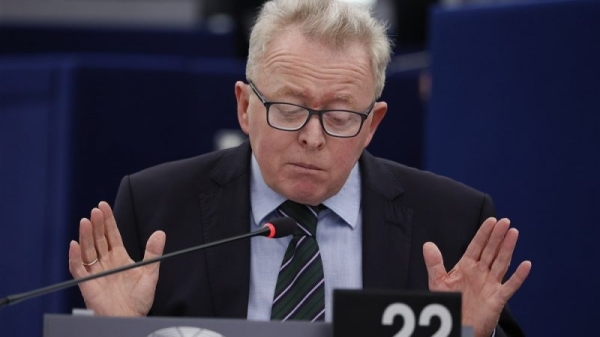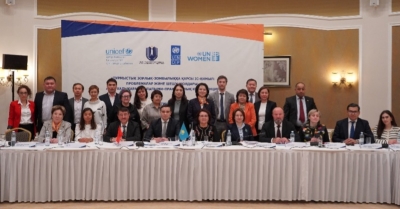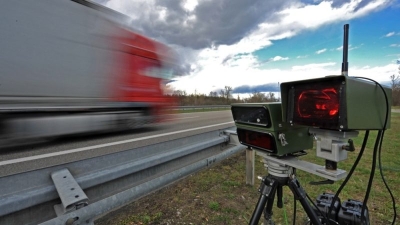Grain imports: Brussels under fire for ‘non-transparent’ approach

While the European Commission defused tensions around Ukrainian grain exports, criticism is increasingly building around how the EU executive handled countries like Poland, which unilaterally imposed import bans.
Brussels faces mounting criticism after it promised several Eastern European states an additional aid package of €100 million to support local farmers who found their markets flooded with low-cost Ukrainian products.
Poland, Hungary, Romania, Bulgaria, and Slovakia took measures to restrict and even stop grain imports from neighbouring war-torn Ukraine because the mass imports drove down local prices, provoking protests from farmers.
After the Commission pledged new aid for local farmers from the crisis fund of the EU’s Common Agricultural Policy (CAP) at the end of April, the countries in question agreed to drop their import bans.
Some 13 EU agriculture ministers sent a letter to the European Commission criticising the handling of the situation and the general approach.
The measures, which the Commission adopted “without consulting the Member States”, “raise serious concerns because they lead to differentiated treatment within the internal market itself”, the letter, published on Friday, reads.
The signatories also fear that the promise of aid money could set a dangerous precedent. The measures “raise questions about the future treatment of cases of a comparable nature or scale”.
On top of that, the 12 countries also accuse the Commission of a “lack of transparency” concerning the possible impact of agricultural aid granted to individual member states on other EU countries and whether it would continue to be paid to Ukraine’s neighbouring countries in the future.

EU offers €100 million top-up for ‘frontline’ countries after Ukraine import ban
The European Commission will provide a further €100 million support package to five EU ‘frontline’ countries in an attempt to alleviate pressure on their farmers, hit by an influx of agricultural goods from Ukraine.
A wrong signal?
Germany is among the countries that view the Commission’s response as a way to reward unilateral and possibly unlawful actions, particularly as trade policy falls within the EU’s competence and not that of the member states.
In a Friday (12 May) speech, German Agriculture Minister Cam Ozdemir called on the Commission to return to a “rules-based system” when distributing money from the crisis fund.
In an exceptional crisis, member states can be assisted with funds from the crisis reserve, of which a maximum of €450 million CAP funds are held in stock each year.
Although Ozdemir expressed solidarity with the affected farmers, he said: “If we are serious about solidarity, then objective criteria will be decisive.”
Indeed, there are other farmers in the EU with good reasons to claim the crisis funds – for example, on the Iberian Peninsula, which is currently facing extreme drought.
According to the Green agriculture minister, the Polish agricultural sector’s problems are partly “home-grown”. For example, Poland’s Agriculture Minister Rafał Romanowski gave poor recommendations to farmers regarding what to buy and sell.

Agrifood Brief: The CAP fourth pillar
The decision to allocate the money to the support package for member states hit by the Ukrainian agriculture influx according to quantitative, rather than qualitative, criteria shows the risk of ‘politicising’ a portion of the EU’s farming subsidies.
You’ve probably read …
Commissioner Wojciechowski on the campaign trail?
The criticism levelled at the EU Commission is particularly sensitive for Agriculture Commissioner Janusz Wojciechowski.
Wojciechowski has long been rumoured to be eyeing political office in his home country Poland following parliamentary elections this autumn.
Speaking about whether Wojciechowski was still doing his job as EU Commissioner or had already embarked on an election campaign at the event Friday, Özdemir said he could understand the interest in ensuring that rural agriculture had a future in his own country.
“But I also want to say that I expect a commissioner to be an EU commissioner first and then, if possible, to be tied to the country,” he added.
Wojciechowski belongs to the ruling Law and Justice party (PiS). He has recently repeatedly promoted the Commission’s aid money in the Polish language and on Polish media, for example, again in a tweet on Monday.
At the national level, PiS has recently been increasingly trying to win over voters from agriculture and rural areas.
Many saw Poland’s decision to stop grain imports from Ukraine in this context, even though it strongly supports the war-torn country in other respects.

Agrifood podcast: Power imbalances and reflections from Ireland
This week, EURACTIV’s agrifood OG’s talk about the divides in the Commission and the increasing marginalisation of EU Agriculture Commissioner Janusz Wojciechowski, and EURACTIV’s Natasha Foote talks reflects on her recent trip to Ireland to the ‘Feeding Ourselves’ gathering and …
Read more with EURACTIV




